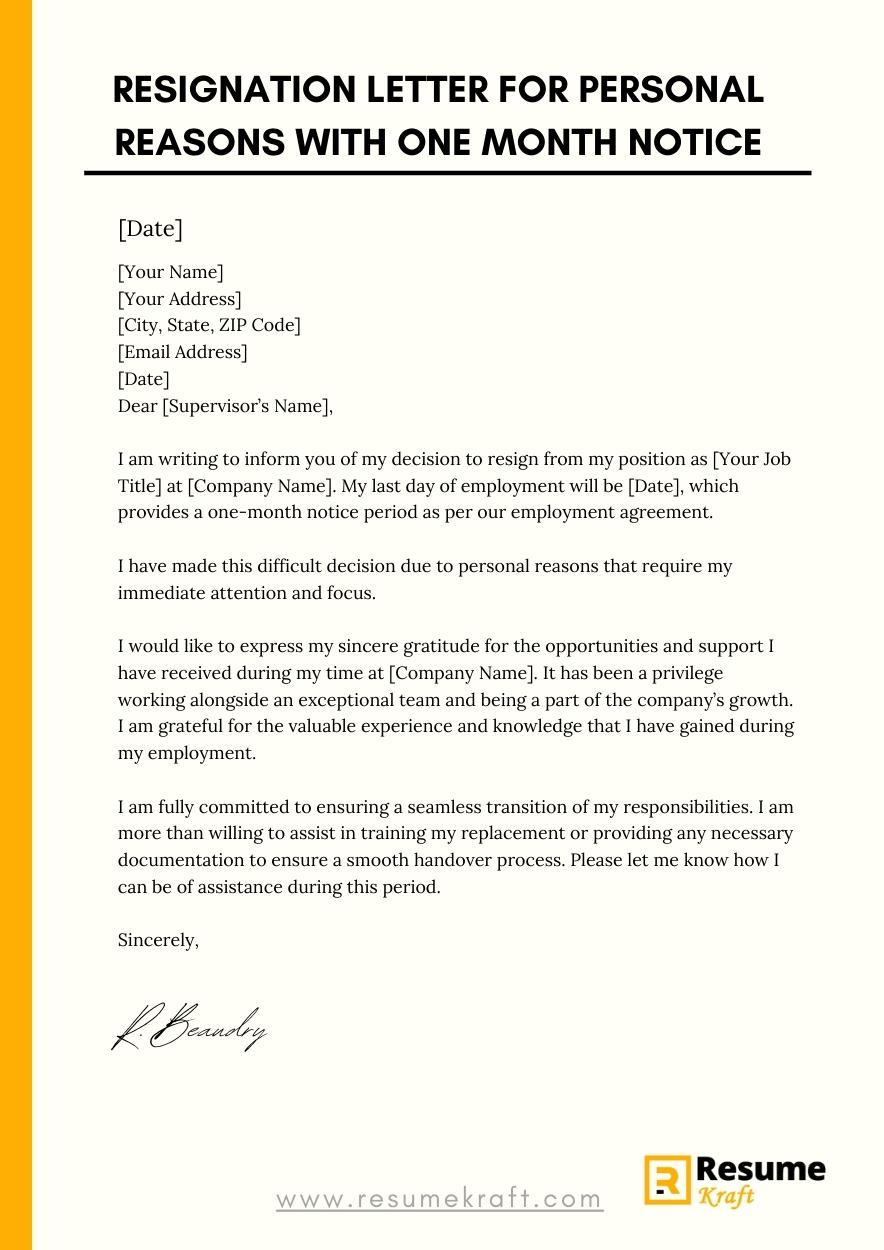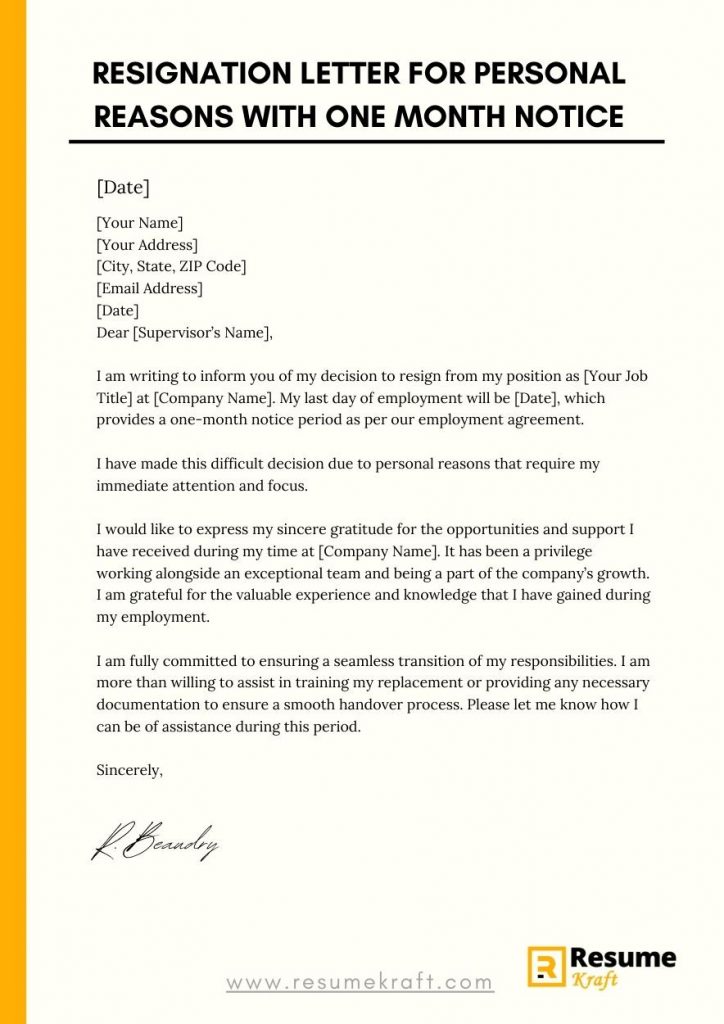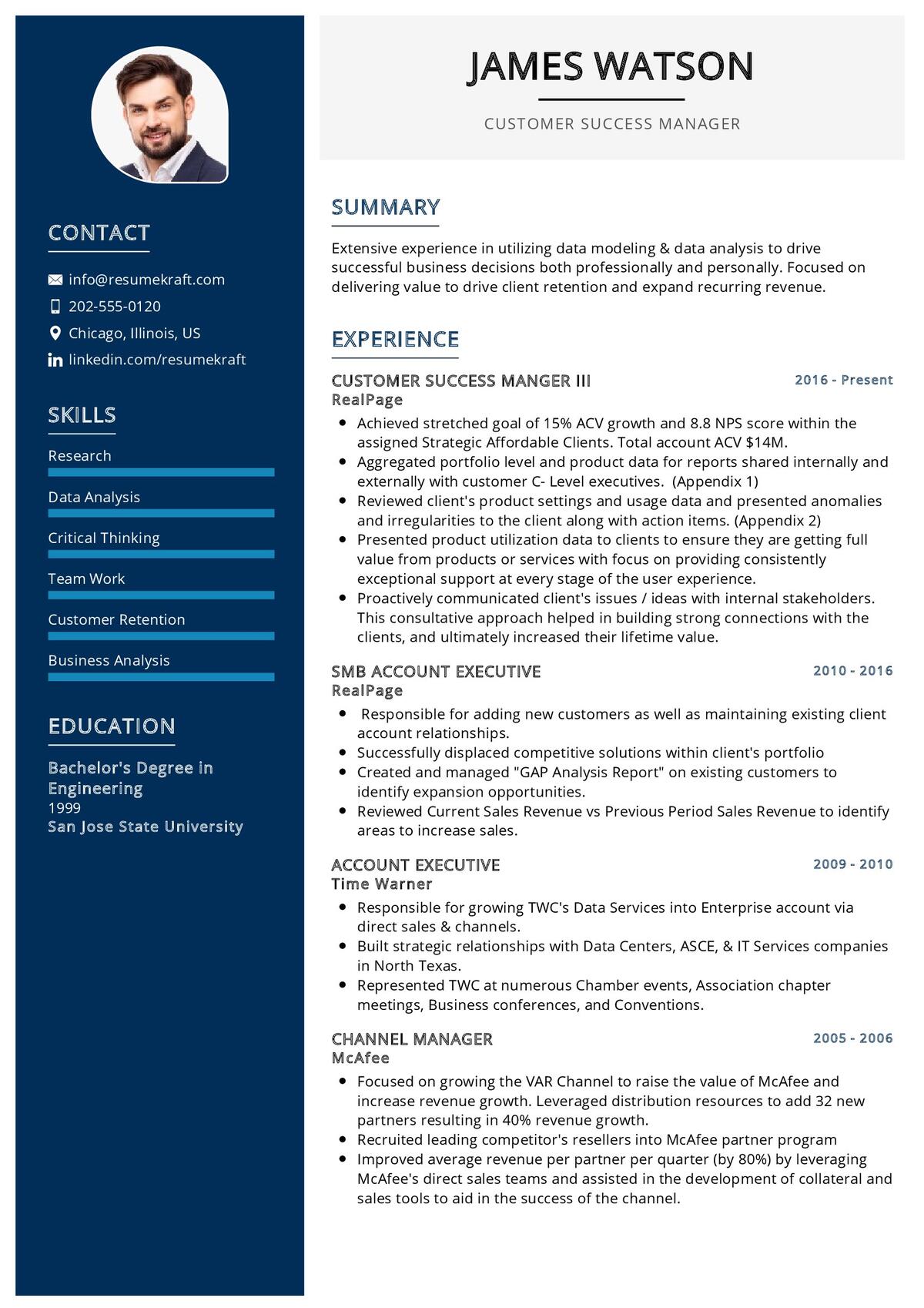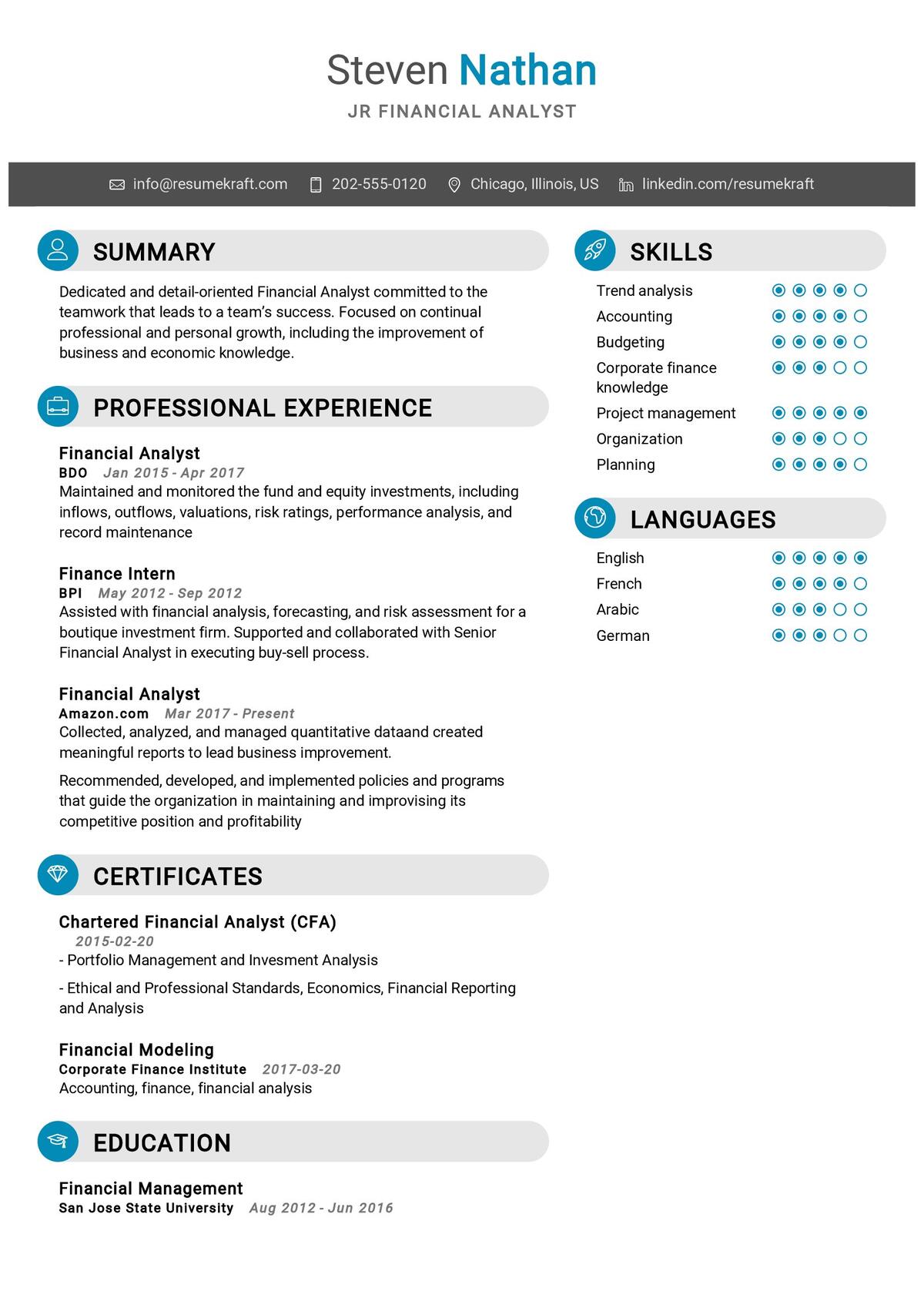
Are you considering resigning from your job for personal reasons but unsure how to put it into words? Writing a resignation letter can seem like a daunting task, but it doesn’t have to be. In this guide, we will walk you through the process of crafting a well-written resignation letter for personal reasons with a one-month notice period. Whether you’re leaving due to family commitments, health reasons, or pursuing a new career path, we’ve got you covered.
A resignation letter is a formal document that notifies your employer of your intention to leave the company. Although it may seem unnecessary or time-consuming, a resignation letter is an important professional courtesy to provide to your employer. It not only allows for a smooth transition but also conveys your professionalism and gratitude for the opportunities you’ve had.
In the following sections, we will discuss what to include and what to avoid in a resignation letter, the proper formatting, and provide you with real-life resignation letter samples for personal reasons with a one-month notice period. Let’s dive in.
What To Include in a Resignation Letter
When writing a resignation letter for personal reasons with a one-month notice, it’s essential to include the following information:
1. Date and Employer’s Contact Information
To ensure clarity and professionalism, start your resignation letter by including the current date and your employer’s contact information. This should be aligned to the left side of the page.
Example:
[Your Name]
[Your Address]
[City, State, ZIP Code]
[Email Address]
[Phone Number]
[Date]
[Employer's Name]
[Employer's Designation]
[Company Name]
[Company Address]
[City, State, ZIP Code]2. Salutation
Address your resignation letter to your immediate supervisor or the appropriate person within your organization. If you have a close relationship with your supervisor, it’s appropriate to use their first name. If not, use their last name with a formal title.
Example:
Dear [Supervisor's Name],3. Statement of Resignation
Clearly state your intention to resign from your position and provide the effective date of your resignation. Giving a one-month notice is standard practice, but be sure to refer to your employment contract or company policies for any specific requirements.
Example:
I am writing to inform you of my decision to resign from my position as [Your Job Title] at [Company Name]. My last day of employment will be [Date], which provides a one-month notice period as per our employment agreement.4. Personal Reason (Optional)
If you feel comfortable, you can briefly mention the personal reason for your resignation. However, keep in mind that you are not obliged to provide extensive details.
Example:
I have made this difficult decision due to personal reasons that require my immediate attention and focus.5. Expression of Gratitude
Express your gratitude for the opportunities and experiences you’ve had during your tenure with the company. This shows professionalism and leaves a positive impression on your employer.
Example:
I would like to express my sincere gratitude for the opportunities and support I have received during my time at [Company Name]. It has been a privilege working alongside an exceptional team and being a part of the company's growth. I am grateful for the valuable experience and knowledge that I have gained during my employment.6. Transition Support
Offer your assistance in making the transition process as smooth as possible. This demonstrates your commitment to the company and helps maintain positive relationships with your colleagues.
Example:
I am fully committed to ensuring a seamless transition of my responsibilities. I am more than willing to assist in training my replacement or providing any necessary documentation to ensure a smooth handover process. Please let me know how I can be of assistance during this period.7. Closing and Signature
End your resignation letter with a professional closing and your signature. Use a formal closure such as “Sincerely” or “Best regards” followed by your typed full name. If you are submitting a physical copy, leave space for your handwritten signature.
Example:
Sincerely,
[Your Full Name]Note:
- Remember to proofread your resignation letter before submission to ensure accuracy and professionalism.
- Keep a copy of your resignation letter for your records.
Now that we’ve covered what to include in your resignation letter, let’s discuss what you should avoid.
What Not to Include in Your Resignation Letter
While it is important to strike the right tone and convey your reasons for resignation, there are certain things you should avoid including in your resignation letter. Here are a few things to steer clear of:
- Negative Comments: Avoid making negative remarks about the company, your colleagues, or the work environment. Maintain a positive and professional tone throughout your letter.
- Excessive Detail: While it’s appropriate to briefly mention the reason for your resignation, avoid providing excessive personal details. This is a professional communication and should focus on your decision to resign.
- Criticism or Complaints: Refrain from criticizing the company’s policies, management, or any other aspect of the organization. Your resignation letter is not the appropriate platform to air grievances.
By following these guidelines, you can ensure your resignation letter remains professional and respectful.
How To Format a Resignation Letter
Formatting your resignation letter correctly is essential for a professional appearance. Here are some formatting tips to keep in mind:
- Font and Size: Use a professional font such as Arial, Calibri, or Times New Roman in a 12-point size.
- Margins: Maintain a standard one-inch margin on all sides of the page.
- Alignment: Align your text to the left side of the page for a clean and organized look.
- Paragraphs: Clearly separate different sections of your letter using paragraphs. This enhances readability and organization.
- Length: Keep your resignation letter concise and to the point. It should ideally fit onto one page.
Now that you know how to structure and format your resignation letter, let’s move on to sample resignation letter examples for personal reasons with a one-month notice.
Resignation Letter Samples

Sample 1: Printed Resignation Letter
[Your Name]
[Your Address]
[City, State, ZIP Code]
[Email Address]
[Phone Number]
[Date]
[Employer’s Name]
[Employer’s Designation]
[Company Name]
[Company Address]
[City, State, ZIP Code]
Dear [Supervisor’s Name],
I am writing to inform you of my decision to resign from my position as [Your Job Title] at [Company Name]. My last day of employment will be [Date], which provides a one-month notice period as per our employment agreement.
I have made this difficult decision due to personal reasons that require my immediate attention and focus.
I would like to express my sincere gratitude for the opportunities and support I have received during my time at [Company Name]. It has been a privilege working alongside an exceptional team and being a part of the company’s growth. I am grateful for the valuable experience and knowledge that I have gained during my employment.
I am fully committed to ensuring a seamless transition of my responsibilities. I am more than willing to assist in training my replacement or providing any necessary documentation to ensure a smooth handover process. Please let me know how I can be of assistance during this period.
Sincerely,
[Your Full Name]
Sample 2: Email Resignation Letter
Subject: Resignation Letter – [Your Name]
Dear [Supervisor’s Name],
I hope this email finds you well. I wanted to formally inform you of my decision to resign from my position as [Your Job Title] at [Company Name].
Please consider this email as my one-month notice, with my last day of employment being [Date]. I have made this decision due to personal reasons that require my immediate attention and focus.
I want to express my deep appreciation for the opportunities I have been given during my time at [Company Name]. Working with such a dedicated team has been an enriching experience for me, and I am grateful for the knowledge and growth that I have gained.
I am committed to making the transition process as seamless as possible. Please let me know how I can assist in training a replacement or preparing any necessary documentation.
Thank you for your understanding, and I remain available for any further discussions or transition support.
Best regards,
[Your Full Name]
Feel free to customize these sample resignation letters to fit your specific situation.
Key Takeaways
Crafting a resignation letter for personal reasons with a one-month notice period may seem challenging, but it can be done with careful consideration and attention to detail. Here are the key takeaways to remember:
- Include essential details such as the date, employer’s contact information, and a statement of resignation with the effective date.
- Express gratitude for the opportunities and experiences you’ve had with the company.
- Offer your assistance in making the transition process as smooth as possible.
- Use a professional tone and avoid negative remarks or excessive personal details.
- Format your resignation letter properly for a clean and organized appearance.
By following these guidelines and utilizing the provided resignation letter samples, you can confidently resign from your job for personal reasons with a one-month notice.
Planning to Write a Resume?
Check our job winning resume samples


Frequently Asked Questions
Q: How long should my notice period be when resigning for personal reasons?
A: The standard notice period for resigning from a job is typically two weeks. However, in cases where you are resigning for personal reasons, it is advisable to give a longer notice period, such as one month. This allows your employer ample time to find a suitable replacement and ensures a smoother transition.
Q: Should I mention the specific personal reasons for my resignation?
A: It is not necessary to provide detailed personal reasons for your resignation in your letter. While you can mention that you are resigning for personal reasons, it is best to keep the details private. If you feel comfortable discussing the reasons with your employer, it is more appropriate to do so in a face-to-face conversation.
Q: Do I need to address my resignation letter to a specific person?
A: Yes, it is important to address your resignation letter to the appropriate person within your organization, typically your immediate supervisor or manager. This ensures that your resignation is received by the relevant party and maintains a professional and respectful tone.
Q: Is it necessary to express gratitude in a resignation letter?
A: Yes, expressing gratitude in your resignation letter is considered a professional courtesy. It shows appreciation for the opportunities and experiences you’ve had during your time with the company. A sincere expression of gratitude can leave a positive impression and help maintain positive relationships with your employers and colleagues.
Q: What if my employer asks me to leave before the one-month notice period?
A: In some cases, your employer may request that you leave before the end of the notice period. This could be due to operational needs or other factors. In such situations, it is important to maintain open communication with your employer and discuss any logistical arrangements. Be prepared for the possibility of an early departure and ensure a smooth handover of your responsibilities.
Conclusion
Writing a resignation letter for personal reasons with a one-month notice doesn’t have to be a daunting task. By following the guidelines provided in this guide and utilizing the sample resignation letter examples, you can craft a professional and respectful letter that effectively communicates your decision. Remember to maintain a positive tone, express gratitude, and offer your support during the transition period. Resigning from a job is a significant decision, and your resignation letter is an opportunity to leave on a positive note.

